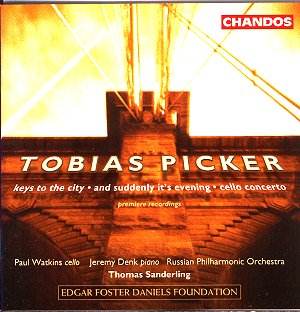Some ten years ago, Virgin released a disc entirely devoted
to some of the early works by Tobias Picker, then in his late thirties
and already with a considerable body of superbly crafted music behind
him. My impression then was of a gifted composer happy to write in a fairly
traditional manner and of well written and colourful music of great appeal
often bringing Copland to mind. The present release provides for a fair
survey of Pickerís progress over the years. The earliest work here was
composed before any of the ones featured in the Virgin disc whereas the
others are fairly recent.
Keys to the City, actually Pickerís
second piano concerto, was composed as the result of a competition,
the prize being a commission for a work celebrating the centenary of
the Brooklyn Bridge. The resulting work is a colourful, jazzy kaleidoscope
vividly evoking a big cityís life. Though fairly rhapsodic, the musicís
structure is nevertheless tightened by the opening gesture, constantly
restated, albeit in variations, throughout the piece. This motif also
appears as the "stomping bass line of the boogie-woogie cadenza".
This playful, unashamedly popular music (in the best meaning of the
word) may bring Gershwin to mind, but is quite typical of Pickerís effusions.
Listening to Suddenly Itís Evening, composed
twelve years later, makes it clear that Picker has progressed in the
intervening years, i.e. stylistically speaking. The music retains its
fluency and ready appeal, but has become more contrapuntal, as is evident
in the first movement in which instrumental groups move at various speeds
over the steady pulse set by the orchestral piano. It is also somewhat
more dissonant, and the overall impact is sometimes like Charles Ives.
The final section of the first movement is crisper and more neatly delineated.
The second movement is a miniature violin concerto (the composerís words)
of great lyrical beauty. However, the fluid violin part is often contradicted
and disrupted by timpani strokes and some nervous rhythmic interjections.
The final movement resembles a stately dance in moderate tempo redolent
of Stravinskyís Danses Concertantes (just to give an idea of
what the music sounds like). Though it was written for young players
(as a joint commission from a consortium of youth orchestras), the music
is by no means easy and must have challenged the young players for whom
it was written. A beautiful work that has become a favourite of mine.
Pickerís Cello Concerto, commissioned
by the BBC and first performed at a Proms concert in 2001, had a somewhat
complicated genesis. It is an in-depth reworking of an early suite for
cello and piano, of which two movements began life as songs. The predominantly
lyrical, song-like outer movements actually betray their vocal origin.
The concerto is laid-out into four movements, in fact two contrasted
Scherzos framed by songs-without-words. So, the first movement is based
on a setting of a poem of e.e. cummings; and is, as already mentioned,
a song without words. The first Scherzo Brief journey is a fast
moving piece of virtuoso writing whereas the second scherzo (actually
a reworking of the third movement of And Suddenly Itís Evening)
presents its original material in a somewhat different light. The final
movement Lament, originated in a song on a poem by W.S. Merwin,
is a deeply-felt and quite moving elegy of great beauty. This major
work amply shows how far Pickerís style and emotional reach has travelled
over the years. (In the meantime he has composed a full length opera
Thérèse Raquin after Zola, available on Chandos
CHAN 9659, which I have not heard so far.)
Pickerís is now a distinguished voice in American music,
and the present release is a timely and most welcome addition to his
discography, and an excellent survey of his stylistic evolution as well.
Immaculate and dedicated playing on both soloistsí part. The Russian
orchestra play this unfamiliar music as if they had known it all their
lives. Recording and production are up to Chandosís best. This release
provides for the best possible introduction to Pickerís superbly crafted
and highly communicative music.
Hubert Culot
